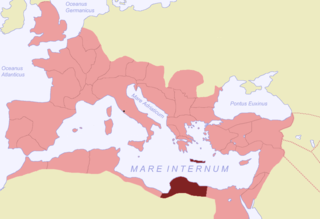AD 33 (XXXIII) was a common year starting on Thursday of the Julian calendar. At the time, it was known in the Roman world as the Year of the Consulship of Ocella and Sulla. The denomination AD 33 for this year has been used since the early medieval period, when the Anno Domini calendar era became the prevalent method in the world for naming years.
AD 62 (LXII) was a common year starting on Friday of the Julian calendar. At the time, it was known as the Year of the Consulship of Marius and Afinius. The denomination AD 62 for this year has been used since the early medieval period, when the Anno Domini calendar era became the prevalent method in Europe for naming years.

Livia Drusilla, also known as Julia Augusta after her formal adoption into the Julian family in AD 14, was the wife of the Roman emperor Augustus Caesar throughout his reign, as well as his adviser. She was the mother of the emperor Tiberius, great-grandmother of the emperor Caligula, grandmother of the emperor Claudius, and the great-great-grandmother of the emperor Nero. She was deified by Claudius who acknowledged her title of Augusta.
Quintus Marcius Barea Soranus was a Roman senator who lived in the reign of Nero. He was suffect consul in 52, but later attracted the hatred of Nero, and upon being condemned to death committed suicide. He was associated with a group of Stoics opposed to the perceived tyranny and autocratic tendencies of certain emperors, known today as the Stoic Opposition.
Gaius Rubellius Plautus was a Roman noble and a political rival of Emperor Nero. Through his mother Julia, he was a relative of the Julio-Claudian dynasty. He was the grandson of Drusus, and the great-grandson of Tiberius and his brother Drusus. Through his great-grandmothers Vipsania Agrippina and Antonia Minor, he was also descended from Marcus Vipsanius Agrippa and Mark Antony. He was descended from Augustus' sister Octavia Minor, herself a grand-niece of Julius Caesar.

Julia Livia, was the daughter of Drusus Julius Caesar and Livilla, and granddaughter of the Roman Emperor Tiberius. She was also a first cousin of the emperor Caligula, and niece of the emperor Claudius.
Gaius Rubellius Blandus was a Roman senator who lived during the Principate. Blandus was the grandson of Rubellius Blandus of Tibur, a member of the Equestrian class, who was the first Roman to teach rhetoric. He was suffect consul from August to December AD 18 with Marcus Vipstanus Gallus as his colleague. In AD 33, he married Julia Livia, granddaughter of the Roman emperor Tiberius.
Gaius, sometimes spelled Gajus, Cajus, Caius, was a common Latin praenomen; see Gaius (praenomen).
Rubellia Bassa was a daughter of Gaius Rubellius Blandus, consul in AD 18 and possibly his wife Julia Livia or an earlier wife.

Octavia the Younger was the elder sister of the first Roman Emperor, Augustus, the half-sister of Octavia the Elder, and the fourth wife of Mark Antony. She was also the great-grandmother of the Emperor Caligula and Empress Agrippina the Younger, maternal grandmother of the Emperor Claudius, and paternal great-grandmother and maternal great-great-grandmother of the Emperor Nero.

Crete and Cyrenaica was a senatorial province of the Roman Empire, established in 67 BC. It comprised the island of Crete and the region of Cyrenaica in present-day Libya.
Marcus Sergius or Servius Octavius Laenas Pontianus was a Roman politician of the early second century. He served as consul in AD 131, alongside Marcus Antonius Rufinus, during the reign of Hadrian.
Papirius Fabianus was an Ancient Roman rhetorician and philosopher from the gens Papirius in the time of Tiberius and Caligula, in the first half of the 1st century AD.

Blaundus was a Roman episcopal city in Asia Minor, presently Anatolia, and is now a Latin Catholic titular bishopric.
Lucius Antistius Vetus was a Roman senator who lived during the Principate. He was consul for the year 55 as the colleague of the emperor Nero.

The Stoic Opposition is the name given to a group of Stoic philosophers who actively opposed the autocratic rule of certain emperors in the 1st-century, particularly Nero and Domitian. Most prominent among them was Thrasea Paetus, an influential Roman senator executed by Nero. They were held in high regard by the later Stoics Epictetus and Marcus Aurelius. Thrasea, Rubellius Plautus and Barea Soranus were reputedly students of the famous Stoic teacher Musonius Rufus and as all three were executed by Nero they became known collectively as the 'Stoic Martyrs'.
Livineius Regulus was a Roman senator, active during the reign of Tiberius. He was suffect consul for February through July of the year 18, succeeding Germanicus as the colleague of Lucius Seius Tubero.
Gaius Octavius Laenas was a Roman senator, who was active during the Principate. He was suffect consul in the second half of AD 33 as the colleague of Lucius Salvius Otho. Laenas was also curator aquarum, or overseer of the aqueducts and water supply of Rome from the death of Marcus Cocceius Nerva from about the year 33 to the year 38.
The gens Rubellia was a minor plebeian family at ancient Rome. Members of this gens are first mentioned in the time of Augustus, and they achieved prominence during the first century, when two of them obtained the consulship: Gaius Rubellius Blandus in AD 18, and Lucius Rubellius Geminus in AD 29.





